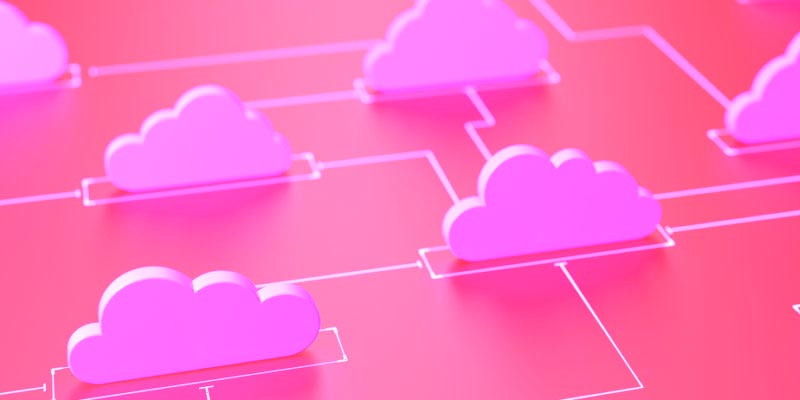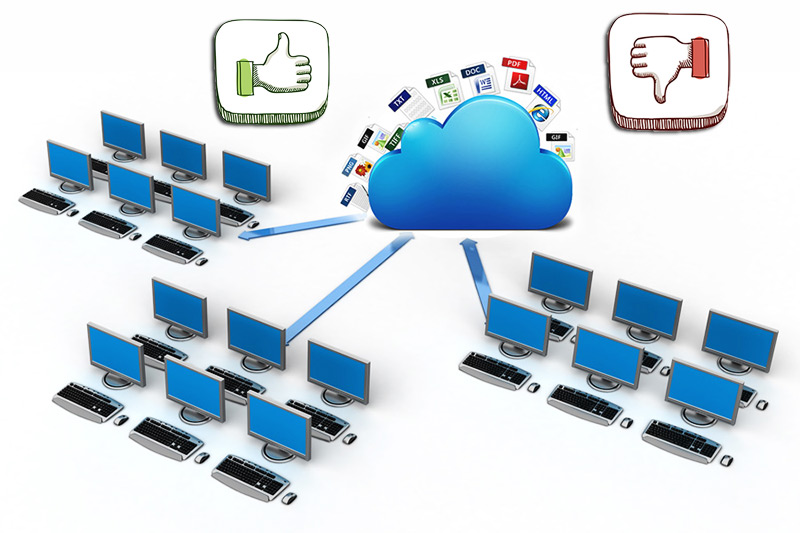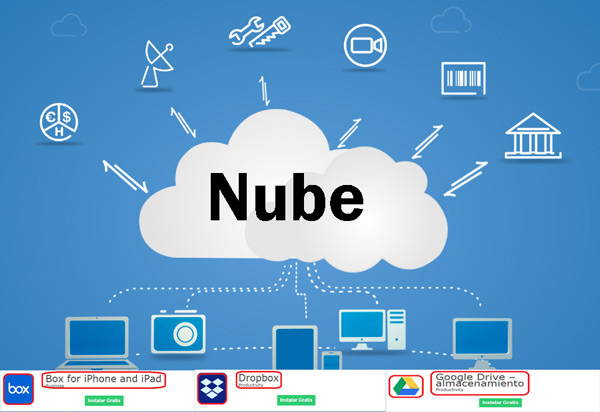
Index:
UPDATED ✅ Do you want to know what cloud computing is and what are the advantages of this technology? ⭐ ENTER HERE ⭐ and know everything about it
In today’s world, along with the great innovations, more and more sectors are joining the taking of benefits derived from computer developments. We see an example of this in the wide use that is being given to software such as Cloud Computing.
We say it because in the beginning it was something in a certain way reserved for large companies, and today we see how that has changed. That’s why this type of services it has been democratized, to the point that it has not only become popular within the business world, but is now available to all Internet users.
In this post you will find All you need to know about Cloud Computing, so that after reading it you will be in a better position to better understand everything related to the subject.
What is cloud computing or cloud computing and what is it for?

We start by telling you that there are several ways to refer to Cloud Computing, so when you hear terms like cloud computing, cloud services, or just ‘the cloud’, you should know that we are talking about exactly the same thing.
Paradigmatically, Cloud Computing is a service that allows the user to transfer part of their information in the form of files and/or programs to a set of remote serverswhich you will always be able to access through a network, which in this case is the Internet.
With the above, you must have already understood that the cloud is used to store many things outside your computer. But everything goes beyond that, since in addition to being able to use the data that you have saved on the aforementioned servers, you can also use programs that the owner of the same makes available to users who contract its services.
Every time you need to make use of the information that you have stored in the cloud, as well as the tools that the provider makes available to you, it is enough to connect to the internet and enter your username and password to access it.
What are the main benefits of cloud computing?

There is no doubt that cloud computing has brought with it a series of benefits, beginning by making available to practically anyone who wants it a series of advantages related to this way of using of computer equipment.
Some of them are shown below:
Flexibility and versatility
One of the most striking features of cloud services is none other than the flexibility they offer when it comes to adapt to the constant changes that occur in the business world at all times.
To this we must add the ease of connecting to the servers from any device, regardless of whether it is a PC, a smartphone, tablet or laptop, which undoubtedly reveals the versatility of cloud services. That’s not counting the scalability of the system.
Information Backup
If we see it from the individual point of view, think of everything you have stored on sites like Facebook, Gmail, Hotmail etc., where without realizing it there is a lot of your information stored on their servers. That without counting everything you send there in the form of automessages to have them as a backup or reminder of many of your activities.
Another example of this, we have it in the increasing number of conglomerates of all levels that send their information to the cloud as a way to have a backup where they can go at any time.
Security
It cannot be denied that this point is the subject of controversy within the universe of Cloud Computing. However, not even the detractors can deny the increasingly efficient security precautions put in place by service providers.
In addition, it is good to take into account that we do not know when our PC, or any other device where we may have information stored, reaches suffer some damage with consequent data loss. When you have them on cloud servers, that risk is minimized.
The efficiency gained in this aspect is reflected in the fact that every day more governments, large conglomerates and individuals from all over the world entrust their files to computer security experts put there by those responsible for the servers.
Automatic Updates
Constant software updating is something that can be too expensive for common users, but when you make use of Cloud Computing servers, this expense certainly ceases to be a concern, which translates into one of its greatest benefits.
All this thanks to the fact that your cloud service provider is in charge of the maintenance and the constant software update, without ever putting at risk any material you have entrusted to it. Imagine all that you save by not having to install custom software that can become obsolete in a short time.
remote access to information
Employees and employers see how this type of computing benefits each other, to the point that no matter where each one is to fulfill their tasks and obligations, since you just need to be connected to the Internet for such purposes.
This is thanks to the multilocation in the provision of the service, which allows connect multiple devices simultaneously from different locations.
Types of computing clouds What are they and how is each one different?
Since there is no single Cloud Computing, it is natural that there are several types, each with its own particularities. So that you know them, You just need to pay attention to the following content:
private cloud
It is the one that has been implemented for a specific entity. Through this type of cloud, many companies ensure keep your sensitive information safewhich they achieve by not allowing entry from a public access point.
The latter is possible thanks to the fact that the company in question, being the owner of the network, the server, the disk and the entire infrastructure in general, is in a position to decide what third parties can access it and the conditions and times in which they can do so.
public cloud
A public computing cloud is one that has been developed by a third party to provide the service to the general public. this provider, being the one who manages everything related to the infrastructure and the services provided through it, is responsible for aspects such as the maintenance and updating of the system software, among others.
The public cloud is used free form by many people, but when it comes to companies, they prefer to hire a paid service of it, with which they achieve some degree of privacy when using the service, as well as greater security guarantees.
hybrid cloud
When two or more providers of different types join their infrastructures to provide the service, what is known as a hybrid cloud is formed. It should be noted that each provider or type of service provider maintains autonomy, since each one controls the parts of their platform.
When using this type of cloud, you have better on-demand scaling. However, difficulties can sometimes arise because it is different environmentsespecially when distributing some applications.
community cloud
Created more than anything for institutional use, it is one that has been organized by a group in order to address issues of common purpose. In other words, it is a pool of resources in the cloud jointly managed and administered by said institutions, which may have a public or private personality.
multi-cloud
As in the case of the hybrid cloud, two or more public and private platforms are involved here, but it differs from that in that not necessarily Providers must be permanently connected to each other. This is because you can use multiple hosts to access services, which is not possible in the hybrid cloud.
Many see it as a great option, since within it you can work fasterwhile offering greater guarantees in terms of security.
Types of cloud computing services, which ones exist and how are they different?

Now we are going to see the types of services that exist in Cloud Computing, so that we are clear how we can benefit from each of them:
IaaS
It is the acronym in English to refer to what we know in Spanish as Infrastructure as a Service. It is specifically about the user being able to use the raw resources of the server, leaving the provider the responsibility in matters such as the administration of the server and the software.
SaaS
It is Software as a Service (Software as a Service), being the model that until now has the greatest popularity among users. Through it, user access to the system is facilitated. via a browser or program interfaceleaving the underlying network, operating system, and other resources running behind the scenes.
PaaS How does it work and what kind of platforms as a service exist?
It is another model or type, in this case known in Spanish as Platform as a Service, and the way to access is identical to that in the case of SaaS. Being that it contains several subtypes, We have decided to dedicate this chapter to get to know them in their functionality:
- public PaaS: They come from SaaS, and originally, as their name indicates, they were intended to be used in public clouds.
- Private PaaS: Although they are mostly downloaded and installed from a company’s local platform, it can also be done from a public network. Once installed, it is very useful for developing applications without losing the benefits of cloud computing.
- Mobile PaaS: Great ally for innovators in everything that has to do with mobile apps.
- open PaaS: Widely used and very useful for those who work with software of Open Sourcewhich can then run applications in that environment.
- Hybrid PaaS: Ideal for those working in a hybrid cloud environment, combining public and private platforms.
- PaaS for Rapid Development: A trend that has been gaining followers, although it is taking its first steps.
What limitations and risks does cloud computing have and how can they be addressed?

Now, no one can ensure that Cloud Computing is free of risks, and even having some limitations. The latter begin by recognizing that without an Internet connection it is sometimes impossible to access the service.
As clients, we always want to be sure that there is someone to turn to when dealing with any legal problem. We say this because the provider’s servers can be located anywhere in the world, in many cases in places whose legislation we are completely unaware of.
Many criticize the fact that Cloud Computing creates a dependency relationship that is too accentuated between the client and the service provider, to the point of ensuring that it is actually a centralized system, where many activities can only be carried out if the latter authorizes it.
But perhaps the biggest concern has to do with our privacy and the security of the data we store in the cloud. This is because everything we pass to the servers in the cloud is no longer under our control. In other words, we can’t be totally sure that someone might be poking around.
In this sense, it is good that precautions are taken to be calmer when we decide to use this service. Especially when it comes to giving importance to always maintaining a backup to physical media of the files we store in the cloud.
Nor should we lose sight of something as simple as change our passwords periodicallythe same as stopping using the same one for all our devices, with which we will be making it difficult for the thousands of hackers that swarm in computer networks.
Computing